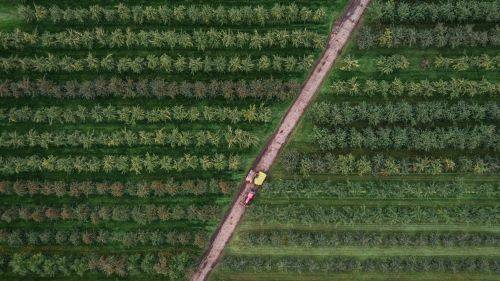A Resilient Food Supply Chain is the First Step in Health for All

A secure food supply chain is critical to ensure that the COVID-19 crisis does not become a cycle of food insecurity and illness. We must rethink our food supply.
This is a special guest commentary piece from Dirk Backhaus.
Food Supply Chains
The coronavirus pandemic has disrupted many global systems, not least the essential supply chains that keep the world’s population fed. Global food supply chains are complex, and each player—farmer, field worker, food processor, retailer—has an important role to play. This emergency has illuminated some kinks in the chain, unfortunately at a time when so much and so many are depending on it. Most noticeable is perhaps the nutrition and health of our population, but for many it is also their livelihoods.
A secure food supply chain is critical to ensure that the current public health crisis does not become a cycle of food insecurity and illness. We must rethink our food supply—a system that was stressed well before the current emergency—to finally create a system that is resilient to global shocks. If we do not do this now, we could drift into a new crisis of poverty and malnutrition. Only a resilient food system will eliminate hunger and create health for all.
Delivering healthy, varied and safe food to dinner tables is a multi-tiered effort with nuances from region to region. For instance, the French green beans on your table may have been cultivated by farmers and laborers in Kenya before they were loaded into trucks, driven to packaging facilities, shipped across the ocean, and eventually placed on grocery shelves. These nurturers of food crops, particularly smallholder farmers, are key to keeping the world fed. But they are constantly faced with obstacles such as trade policies, travel restrictions, crop disease, and the closure of village marketplaces.
We are faced with the paradox of too much food and yet not enough. Food is wasted in some places while others see empty shelves at their markets. Even before the COVID-19 pandemic, one third of food produced in the world was lost before it could be consumed. Food waste is predicted to increase due to the unavailability of labor, limited trade, closed borders and restrictions in sending products to market. Changes in consumer behavior have created additional uncertainty. As restaurants and cafés closed during the pandemic, farmers were left with surplus products. Dairy Farmers of America, the biggest dairy cooperative in the United States, reports producers are throwing away as much as 3.7 million gallons of milk per day due to the sudden decrease in demand. A new food supply organization must prepare for unexpected as well as common scenarios to close the gap between excess and scarcity.
I am privileged and humbled to work at a company that is uniquely positioned at the intersection of agriculture and health. The past several months at Bayer have been eye-opening and especially meaningful as we partner with so many others to curtail the impacts of the current crisis. We are leveraging our global scale, network and relationships to identify current and emerging threats. We are fostering partnerships and collaborating with governments, academia, distributors and food retailers to ensure supply lines and borders remain open and responsive. With a new vision of ‘Health for all. Hunger for none,’ we are innovating on several fronts to do our part:
- Investing in scientific research to find sustainable solutions that promote the United Nations Sustainable Development Goal 2 – Zero Hunger. By sharing knowledge, resources and goals, we’re bringing the benefit of insights and knowledge to more people, particularly to help farmers around the world who are so essential for our food system.
- Ensuring continued supply of products and services by mobilizing our teams across the world to get crop protection, data and seeds to farmers at the right time. This requires significant collaboration and flexibility from thousands of people. We are striving for greater connectedness and partnerships across borders to create long-term resiliency.
- Leveraging science and data to deliver problem-focused solutions that take us one step closer to a more sustainable and food secure future. We are advocating for greater use of technology and data, and collaborating with new partners to ensure transparency and better understanding. For example, we are very excited about a new partnership with the Harvard Data Science Initiative to support the study of trust in science.
As hopeful as I am of what my organization can accomplish, I know it will take a multi-pronged approach by all in the agriculture, production, scientific, retail and government communities to create global food security and protect growers around the world. On June 22, 2020, the Council hosted an online panel on "Building Better, More Resilient Food Systems." I encourage you to watch this important conversation with agriculture leaders as they discuss immediate and long-term solutions.
The pandemic has brought things to light and exposed kinks in the chain for the public to see. We all need to apply our learnings from this current crisis to adopt new approaches to our businesses at speed and scale. If we foster multilateral cooperation and dialogue across borders, advance and fund continued innovation, and help communities where we live and work, we are capable of building a more resilient food system that will one day eliminate hunger and promote health for all.